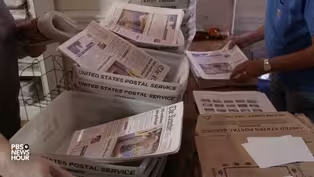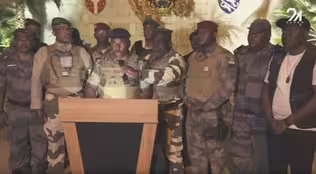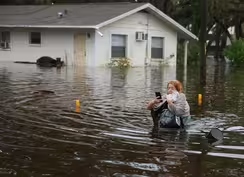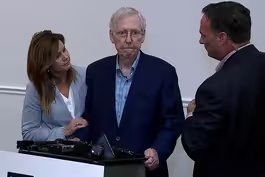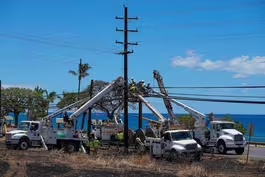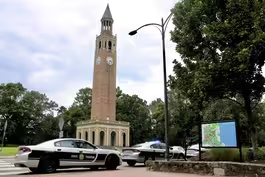
FEMA administrator on federal response to Hurricane Idalia
Clip: 8/30/2023 | 4m 57sVideo has Closed Captions
FEMA administrator discusses federal response to Hurricane Idalia
FEMA Administrator Deanne Criswell is heading to Florida to assess Hurricane Idalia’s damage first-hand. Before departing Washington, she joined Amna Nawaz to discuss the federal response.
Problems playing video? | Closed Captioning Feedback
Problems playing video? | Closed Captioning Feedback
Major corporate funding for the PBS News Hour is provided by BDO, BNSF, Consumer Cellular, American Cruise Lines, and Raymond James. Funding for the PBS NewsHour Weekend is provided by...

FEMA administrator on federal response to Hurricane Idalia
Clip: 8/30/2023 | 4m 57sVideo has Closed Captions
FEMA Administrator Deanne Criswell is heading to Florida to assess Hurricane Idalia’s damage first-hand. Before departing Washington, she joined Amna Nawaz to discuss the federal response.
Problems playing video? | Closed Captioning Feedback
How to Watch PBS News Hour
PBS News Hour is available to stream on pbs.org and the free PBS App, available on iPhone, Apple TV, Android TV, Android smartphones, Amazon Fire TV, Amazon Fire Tablet, Roku, Samsung Smart TV, and Vizio.
Providing Support for PBS.org
Learn Moreabout PBS online sponsorshipGEOFF BENNETT: And let's turn now to the federal response.
AMNA NAWAZ: Well, FEMA Administrator Deanne Criswell is leaving Washington for Florida later today to assess Hurricane Idalia's damage firsthand.
And she joins us now.
Administrator, welcome back to the "NewsHour."
You have spoken quite a bit about all the resources that were prepositioned and standing by for when the storm hit.
It has now made landfall continues to move across the Southeast.
What can you tell us about how FEMA resources are currently deployed?
DEANNE CRISWELL, FEMA Administrator: Yes, Amna, I think the biggest thing right now is that we have the resources that are in place to support any lifesaving activities that need to happen.
Unfortunately, there are many people that chose not to evacuate.
And I know that our first responders, the really amazing brave men and women that are out there every day, have been going in to help that.
Our resources are there to support if they need to be.
And then we are posturing and getting ready to start to do rapid assessments to really understand what the impacts Hurricane Idalia has had on all of the states that it has crossed.
AMNA NAWAZ: We heard bits and pieces of reports from different places of exactly about people who did not evacuate, the mayor of Cedar Key, for example, saying there were 100 people there who had planned to stay put.
Do you have a bigger assessment?
How many people are you talking about who did not evacuate?
DEANNE CRISWELL: Yes, I don't personally have that number.
I would defer to the local officials, right?
They're the ones that are on the ground and know their communities to know who evacuated and perhaps who stayed behind.
Our focus is going to be able to send in any federal resources, if needed, to help support getting these people to safety now, if they need additional help from what the local first responders and the state teams are already doing.
AMNA NAWAZ: So, residents who've lived through this, who may be starting to assess the damage done there, what should they be doing to make sure they are in line for FEMA support?
Should they be documenting damage, getting in touch with your office somehow?
What's your message to them?
DEANNE CRISWELL: Well, my first message is make sure that you're doing it in a way that is safe.
There is still a lot of hazards out there, right?
We have downed power lines.
We have water in the streets still.
We have a lot of debris that was moved into the area.
So that area is still very dangerous.
And as individuals go back into their homes, they need to make sure that they're protecting themselves and they're staying out of harm's way.
Then the next thing to do is contact your insurance company, right?
Your first -- that first step, make sure you make that phone call to see what is covered and what's not covered.
And as they go in, absolutely, they need to start taking pictures and documenting what the types of damages are.
And after we work through the assessments and work with the governor to determine what level of additional federal assistance may be available, that bit of information is going to be extremely important.
AMNA NAWAZ: Administrator, you have said that the FEMA disaster relief fund is around $3.4 billion right now, that you're prioritizing funding for Idalia and for those horrific Maui fires people are still recovering from.
I want to put to you some concerns that Florida Senator Marco Rubio had.
He said that reimbursements to local governments for previous storms are still in the pipeline, and prioritizing new storms creates problems for those local governments.
What do you say in response to that?
DEANNE CRISWELL: Yes, our focus and our priority is to make sure that we can always support lifesaving missions, right?
That is what we are prioritizing the remaining balance of the disaster relief fund for, so we can have enough funding to send the search-and-rescue teams out there or power generation out there after a storm and ensure that those that are in harm's way don't have increased damage.
That's my priority.
The work itself and these other communities, this longer-term recovery work, it doesn't stop.
But it will delay the payments until the next fiscal year, if it's not a lifesaving activity that's needed right now.
AMNA NAWAZ: What about in terms of staff?
The New York Times reported this morning that just 19 percent of FEMA staff is available at the moment, compared to 31 percent this day last year?
Do you have the team that you need to meet the response right now?
DEANNE CRISWELL: Yes, we certainly are responding to a wide number of events across the country.
And the percentage of the staff that is referenced is related to our disaster work force.
But we also have all of our steady state employees that we will tap into and we can mobilize in to support our efforts.
And we also have what we call the DHS Surge Capacity, where the secretary has given us the ability to use volunteers from all of the different departments or agencies across the department, have them come in and support us.
And I think that last roster is somewhere over 6,000 people from across the department are signed up to support our efforts if we need them.
And so we have these layers in place as we continue to respond to multiple events.
AMNA NAWAZ: FEMA Administrator Deanne Criswell, thank you so much for joining us.
Safe travels to Florida, and please come back soon.
DEANNE CRISWELL: Thank you, Amna.
Stay safe.
Connecting the decline of local news and political division
Video has Closed Captions
Clip: 8/30/2023 | 11m 28s | The connections between decline of local news and growing political division (11m 28s)
Frances Tiafoe's journey to becoming a top tennis player
Video has Closed Captions
Clip: 8/30/2023 | 8m 31s | Frances Tiafoe shares rollercoaster journey to becoming one of tennis's top players (8m 31s)
Gabon's military ousts president in latest coup in Africa
Video has Closed Captions
Clip: 8/30/2023 | 7m 2s | Gabon's military ousts president in latest coup in Africa (7m 2s)
A look at the damage after Hurricane Idalia slammed Florida
Video has Closed Captions
Clip: 8/30/2023 | 7m 2s | A look at the damage after Hurricane Idalia slammed Florida as a Category 3 storm (7m 2s)
McConnell freezes up during news conference for 2nd time
Video has Closed Captions
Clip: 8/30/2023 | 2m 32s | Mitch McConnell freezes up during news conference for 2nd time this summer (2m 32s)
News Wrap: Maui receives grant to strengthen electrical grid
Video has Closed Captions
Clip: 8/30/2023 | 4m 27s | News Wrap: Maui receives $95 million grant to strengthen electrical grid (4m 27s)
UNC newspaper shares messages sent during campus shooting
Video has Closed Captions
Clip: 8/30/2023 | 6m 21s | UNC newspaper editor on emotional front page featuring messages sent during shooting (6m 21s)
Providing Support for PBS.org
Learn Moreabout PBS online sponsorship
- News and Public Affairs

FRONTLINE is investigative journalism that questions, explains and changes our world.

- News and Public Affairs

Amanpour and Company features conversations with leaders and decision makers.












Support for PBS provided by:
Major corporate funding for the PBS News Hour is provided by BDO, BNSF, Consumer Cellular, American Cruise Lines, and Raymond James. Funding for the PBS NewsHour Weekend is provided by...

